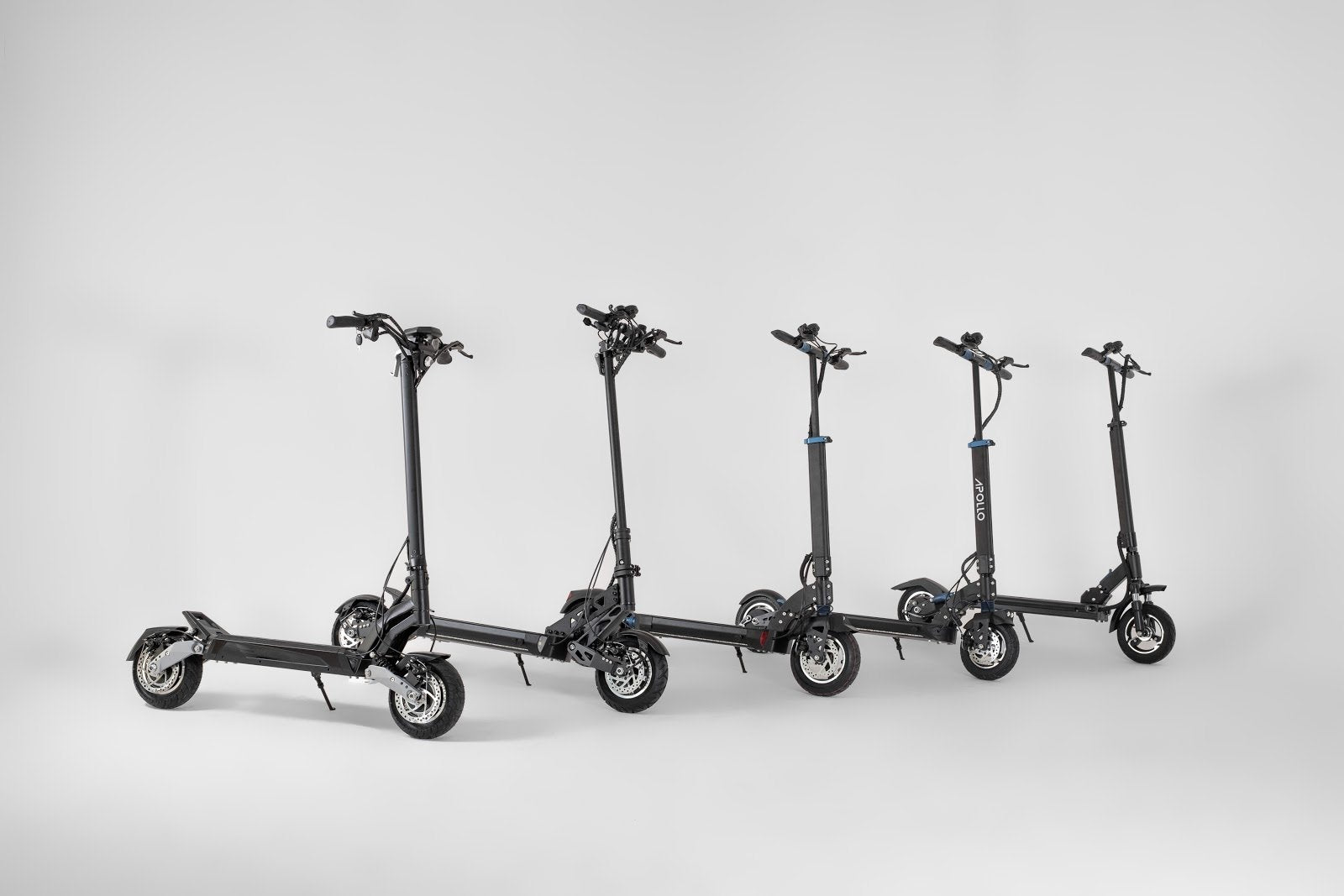To rent electric scooters in Montreal or not to rent - benefits of owning vs. renting.
To rent electric scooters in Montreal or not to rent - benefits of owning vs. renting.
With the rise of global and local electric scooter sharing companies, renting scooters by-the-minute has never been more accessible in today’s major cities. However, as with all short term rentals, there is a price premium. In this article we search for the tipping point - how much do you have to use Lime or Bird scooters before it makes more sense to own a scooter instead.
Lime has launched in three Canadian cities so far, (Calgary, Edmonton, and Montreal) bringing electric scooter sharing to roughly 4 million Canadians. While this is still a long way from making electric scooters the main mode of transportation, we are slowly starting to notice the transition. Electric scooters are no longer just a tourist attraction or a means of getting home from the bar when no taxis are available (for the record, we do not recommend using scooters under the influence of alcohol) - for an increasing number of Canadians, they are becoming an alternative mode of transportation. This includes daily commutes to work or school, as well as the in-between moments, when driving a car isn’t quite worth it, but walking would take too long. This phenomenon is further supported by regulatory changes, which show a lot of promise. You can get the latest updates on electric scooter laws here.
The financial benefit of owning an electric scooter
Let’s get into the crooks of this question - when does it make sense to rent an electric scooter vs. own one? There are two parts to this answer - the first is a numerical answer based on usage frequency, the other half takes into consideration non-financial factors (such as convenience of electric scooters, repairs and maintenance, or usage of electric scooters beyond work commutes).
Let’s start by laying out the equation:
Daily cost of using shared electric scooters:
A * ((((B / 15) * 60) * $0.30) + $1.00)
A = # of electric scooter trips per day
B = commute distance in kilometers
Where did the number 15 come from? 20km/h is the max speed of Lime scooters, but in reality you will need to factor in traffic, lights, and other stops which would make the average speed of the journey around 25% less or roughly 15km/h.
$0.30 is the cost of Lime scooter rental on a minute basis, and the $1.00 is the flat fee to unlock electric scooters in Canada.
Use the above to figure out exactly what you’re spending on Lime, or what you would be spending if you were to use it. In the meantime, we’ll walk through an example using average data we found online. Statcan suggests the average work commute in Canada is 8.7 kilometers. For the sake of this exercise we will assume we would use the shared electric scooter 4 times a week, and either bus/drive/carpool on the 5th day. In that case, the cost of renting electric scooters would be:
2 * ((((8.7/15) * 60) * $0.30) + $1.00) = $22.88
Ouch… nearly $23 for a round trip to work on an electric scooter. This works out to $91.52/week or $366.08/month without tax. Given Canada’s wonderful seasons, you’re realistically looking at the electric scooter season being April to October, which makes the annual rental cost $2,562.56.
For comparison, the cheapest scooter in our offering is the Xiaomi M365 at $649 plus tax. In terms of performance and specs, it is actually superior to Lime as it can reach a top speed of 25km/h and offers a range of 25-30 kilometers. Oh, and it looks better too. For the more demanding riders, you can also find electric scooters like the Mercane Widewheel or Evolv Tour which offer better performance.
You can finance it over any period, but let’s assume you’d choose to do it over 12 months. Assuming an average tax rate of 13%, you are looking at $73.33/month in payments.
To sum it up, renting a lime scooter for twice a day, 4 days a week, for 7 months a year will cost you $2,562.56 plus taxes. In turn, owning a comparable if not better scooter, will work out to around $733 with taxes included.
Non-financial reasons for & against renting electric scooters
Let's start with the obvious one - convenience. Shared electric scooters are famously ubiquitous (sometimes to their demise), but generally speaking they are fairly easy to come by. That is except for during rush hour, which is ironically when they are needed the most. Another consideration is having to find electric scooters that are charged (it’s not always a given). That said, the convenience of simply being able to leave it anywhere when your ride is over is tough to beat. On the other hand, what about the convenience of owning electric scooters? The main advantage is not having to rely on a network of electric scooters in unknown condition and without any availability guarantees. You have complete control over when to use your scooter and for how long (the smart lock’s of today are also incredibly secure, allowing you to lock your scooter on a bike rack while you make a quick stop at the grocery store for example). There are no overage charges, no uncharged scooters, no late mornings spent looking for the nearest Lime or Bird. Ultimately, this will come down to how often you use your scooter. If it’s a daily mode of transportation, having to rely on Lime or Bird electric scooters will become a frustration. If it’s a once a week type-of-trip, especially when you have back up options (e.g. public transit), you will be better off with Lime.
The Irony in this is that the whole convenience factor is somewhat arbitrary - they advertise that you can use a rental scooter whenever you need, however it's illegal to ride it without a helmet. Not sure about you, but I don’t happen to walk around with a helmet in my pocket, making this quite a big issue for the convenience aspect of scooter sharing.
Secondly, you have to consider the one size fits all argument. As human beings, we all have different needs and desires. The Lime and Bird scooters all have a speed limit of 20km/h, a weight limit of 100kgs and can’t make it up a 5 degree hill (exaggerating - but you can walk faster). Sure, it's a fun experience to try once with the family or friends, but having to commute every day to work really limits the fun and convenience of an electric scooter. On the electric scooter market today, you have scooters that can hold a 70km charge (Evolv Tour), can hit speeds of up to 45km/h (Mercane WideWheel Pro), and can support weights up to 250lbs (Evolv Pro). Yes it’s a commitment to purchase, but the cost savings, enjoyment and convenience is priceless when you find that right electric scooter that you connect with right away.
Conclusion: should you buy or rent electric scooters?
In conclusion, the math is fairly simple. If you use a scooter more than twice a week (two round trips) for at least half a year, you may want to consider getting your own electric scooter. If you are a recreational user, you will do perfectly fine with Lime or Bird, despite their limitations. If, however, you are looking for a reliable commuter vehicle, owning one takes precedence over renting one! And we all know, once you try one of these, you fall in love with the feeling of driving an e-scooter. It’s an investment in both, your morning commute and the environment that you are sure not to regret.
READ NEXT
Electric Scooter Buying Guide
With the rise of global and local electric scooter sharing companies, renting scooters by-the-minute has never been more accessible in today’s major cities. However, as with all short term rentals, there is a price premium. In this article we search for the tipping point - how much do you have to use Lime or Bird scooters before it makes more sense to own a scooter instead.
Lime has launched in three Canadian cities so far, (Calgary, Edmonton, and Montreal) bringing electric scooter sharing to roughly 4 million Canadians. While this is still a long way from making electric scooters the main mode of transportation, we are slowly starting to notice the transition. Electric scooters are no longer just a tourist attraction or a means of getting home from the bar when no taxis are available (for the record, we do not recommend using scooters under the influence of alcohol) - for an increasing number of Canadians, they are becoming an alternative mode of transportation. This includes daily commutes to work or school, as well as the in-between moments, when driving a car isn’t quite worth it, but walking would take too long. This phenomenon is further supported by regulatory changes, which show a lot of promise. You can get the latest updates on electric scooter laws here.
The financial benefit of owning an electric scooter
Let’s get into the crooks of this question - when does it make sense to rent an electric scooter vs. own one? There are two parts to this answer - the first is a numerical answer based on usage frequency, the other half takes into consideration non-financial factors (such as convenience of electric scooters, repairs and maintenance, or usage of electric scooters beyond work commutes).
Let’s start by laying out the equation:
Daily cost of using shared electric scooters:
A * ((((B / 15) * 60) * $0.30) + $1.00)
A = # of electric scooter trips per day
B = commute distance in kilometers
Where did the number 15 come from? 20km/h is the max speed of Lime scooters, but in reality you will need to factor in traffic, lights, and other stops which would make the average speed of the journey around 25% less or roughly 15km/h.
$0.30 is the cost of Lime scooter rental on a minute basis, and the $1.00 is the flat fee to unlock electric scooters in Canada.
Use the above to figure out exactly what you’re spending on Lime, or what you would be spending if you were to use it. In the meantime, we’ll walk through an example using average data we found online. Statcan suggests the average work commute in Canada is 8.7 kilometers. For the sake of this exercise we will assume we would use the shared electric scooter 4 times a week, and either bus/drive/carpool on the 5th day. In that case, the cost of renting electric scooters would be:
2 * ((((8.7/15) * 60) * $0.30) + $1.00) = $22.88
Ouch… nearly $23 for a round trip to work on an electric scooter. This works out to $91.52/week or $366.08/month without tax. Given Canada’s wonderful seasons, you’re realistically looking at the electric scooter season being April to October, which makes the annual rental cost $2,562.56.
For comparison, the cheapest scooter in our offering is the Xiaomi M365 at $649 plus tax. In terms of performance and specs, it is actually superior to Lime as it can reach a top speed of 25km/h and offers a range of 25-30 kilometers. Oh, and it looks better too. For the more demanding riders, you can also find electric scooters like the Mercane Widewheel or Evolv Tour which offer better performance.
You can finance it over any period, but let’s assume you’d choose to do it over 12 months. Assuming an average tax rate of 13%, you are looking at $73.33/month in payments.
To sum it up, renting a lime scooter for twice a day, 4 days a week, for 7 months a year will cost you $2,562.56 plus taxes. In turn, owning a comparable if not better scooter, will work out to around $733 with taxes included.
Non-financial reasons for & against renting electric scooters
Let's start with the obvious one - convenience. Shared electric scooters are famously ubiquitous (sometimes to their demise), but generally speaking they are fairly easy to come by. That is except for during rush hour, which is ironically when they are needed the most. Another consideration is having to find electric scooters that are charged (it’s not always a given). That said, the convenience of simply being able to leave it anywhere when your ride is over is tough to beat. On the other hand, what about the convenience of owning electric scooters? The main advantage is not having to rely on a network of electric scooters in unknown condition and without any availability guarantees. You have complete control over when to use your scooter and for how long (the smart lock’s of today are also incredibly secure, allowing you to lock your scooter on a bike rack while you make a quick stop at the grocery store for example). There are no overage charges, no uncharged scooters, no late mornings spent looking for the nearest Lime or Bird. Ultimately, this will come down to how often you use your scooter. If it’s a daily mode of transportation, having to rely on Lime or Bird electric scooters will become a frustration. If it’s a once a week type-of-trip, especially when you have back up options (e.g. public transit), you will be better off with Lime.
The Irony in this is that the whole convenience factor is somewhat arbitrary - they advertise that you can use a rental scooter whenever you need, however it's illegal to ride it without a helmet. Not sure about you, but I don’t happen to walk around with a helmet in my pocket, making this quite a big issue for the convenience aspect of scooter sharing.
Secondly, you have to consider the one size fits all argument. As human beings, we all have different needs and desires. The Lime and Bird scooters all have a speed limit of 20km/h, a weight limit of 100kgs and can’t make it up a 5 degree hill (exaggerating - but you can walk faster). Sure, it's a fun experience to try once with the family or friends, but having to commute every day to work really limits the fun and convenience of an electric scooter. On the electric scooter market today, you have scooters that can hold a 70km charge (Evolv Tour), can hit speeds of up to 45km/h (Mercane WideWheel Pro), and can support weights up to 250lbs (Evolv Pro). Yes it’s a commitment to purchase, but the cost savings, enjoyment and convenience is priceless when you find that right electric scooter that you connect with right away.
Conclusion: should you buy or rent electric scooters?
In conclusion, the math is fairly simple. If you use a scooter more than twice a week (two round trips) for at least half a year, you may want to consider getting your own electric scooter. If you are a recreational user, you will do perfectly fine with Lime or Bird, despite their limitations. If, however, you are looking for a reliable commuter vehicle, owning one takes precedence over renting one! And we all know, once you try one of these, you fall in love with the feeling of driving an e-scooter. It’s an investment in both, your morning commute and the environment that you are sure not to regret.
READ NEXT



















